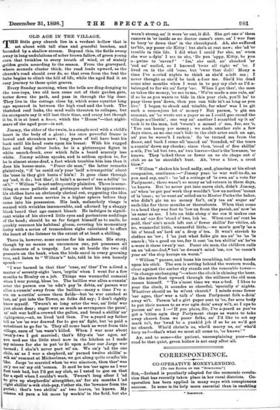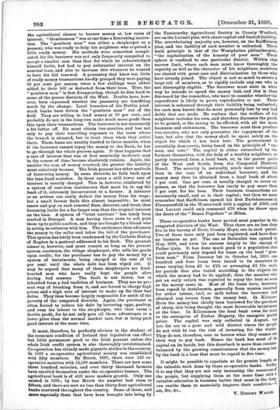CORRESPONDENCE.
CO-OPERATIVE MONEYLENDING.
[To THZ EDITOR OP THZ " SPECTATOR...1 Sin,—Ireland is peculiarly adapted for the economic revolu- tion that has recently taken place in her rural districts. Co- operation has been applied in many ways with conspicuous success. In none is its help more essential than in enabling
• Scarecrow.
the agricultural classes to borrow money at low rates of interest. " Gombeemsm " was at one time a flourishing institu- tion. The " gombeen man" was either a shopkeeper or a peasant, who was ready to help his neighbour who required a little ready money. His methods were somewhat compli- cated, for the borrower was not only frequently compelled to accept a smaller sum than that for which he acknowledged himself liable, but had to pay substantial interest on the nominal loan, and also to increase this whenever he wanted to have his bill renewed. A peasantry that knew but little of ready-money transactions hardly grasped they were paying
30 per cent, per annum when a few shillings were either added to their bill or deducted from their loan. True, the " gombeen man" is fast disappearing, though he dies hard in some of the poorer districts of the West. Doubts have, how- ever, been expressed whether the peasantry are benefiting much by the change. Local branches of the Dublin joint- stock banks have driven the " gombeen man" out of the field. They are willing to lend money at 10 per cent., and probably do not in the long-run make much more profit than this upon their transactions. The borrower is not necessarily a bit better off. He must obtain two sureties, and has not only to pay their travelling expenses to the town where the branch is situated, but to treat them when they arrive there. These loans are usually limited to three months, when if the borrower cannot repay the money to the Bank, he has to go through the whole process again. It thus happens that a rate of interest that was at first nominally moderate may in the course of time become absolutely ruinous. Again, the smaller the sum of money required, the greater the liability must relatively become. The Irish peasant has other methods of borrowing money. In some districts, he falls back upon the loan-fund societies. In these cases a still lower rate of interest is usually charged. This is, however, reinforced by a system of cast-iron instalments that must be, to say the least of it, extremely inconvenient to a farmer. A labourer or an artisan can easily deduct the money from his wage ; but a small farmer finds this almost impossible; he must renew and pay on each renewal fines, discount, and treat, thus becoming liable for a far larger sum than the original interest on the loan. A system of "trust auctions" has lately been started in Donegal. A man having three cows to sell puts them up to public auction, and they are bought by a friend who is acting in collusion with him. The auctioneer then advances the money to the seller and takes the bill of the purchaser. This system has lately been condemned by the Catholic Bishop of Raphoe in a pastoral addressed to his flock. The greatest sinner is, however, and must remain as long as the present system continues, the village shopkeeper, who sells his goods upon credit; for the purchaser has to pay the money by a system of instalments, being charged at the rate of 10 per cent, until the whole debt has been wiped out. It may be argued that many of these shopkeepers are kind- hearted men who have really kept the people alive during bad seasons. The fault is not theirs, but is inherited from a bad tradition of business. They see no pre- sent way of breaking from it, and are forced to charge high prices and a high rate of interest to make up for their bad debts. They thus become largely responsible for much of the poverty of the congested districts. Again, the purchaser is often forced to reduce his debt by bartering eggs, poultry, and even his labour to the shopkeeper, who thus earns a double profit, for he not only gets all these advantages at a lower price than the normal market rate, but is being paid good interest at the same time.
It must, therefore, be perfectly obvious to the student of the economic condition of Ireland that legislation can effect but little permanent good to the Irish peasant unless the whole Irish credit system is also thoroughly revolutionised. Co-operation has already made gigantic strides in the country. In 1889 a co-operative agricultural society was established with fifty members. By March, 1897, there were 143 co- operative societies with 14,290 members. There are now some three hundred societies, and over thirty thousand farmers have enrolled themselves under the co-operative banner. The agricultural bank is of still more modern growth. Only one existed in 1895; by last March the number had risen to fifteen, and there are now no less than thirty-four agricultural banks scattered throughout the country. Some of these, and more especially those that have been brought into being by the Enniscorthy Agricultural Society in County Wexford, are on the Luzzati plan, with share capital and limited liability. The overwhelming majority are, however, on the Raiffeissen plan, and the liability of each member is unlimited. Their main principle is that of the Westphalian philanthropist, "the capitalisation of the honesty of poor men." Their sphere is confined to one particular district. Within this narrow limit, where each man must know thoroughly the capacity as well as the character of his neighbour, members are elected with great care and discrimination by those who have already joined. The object is not so much to secure a large roll of members, as to rigidly exclude any one who is not thoroughly eligible. The borrower must state in what way he intends to spend the money lent, and this is then discussed by the committee, who have to consider whether the expenditure is likely to prove reproductive or not. Their interest is enhanced through their liability being unlimited; for each man knows that he must personally lose by any bad debts that are made. He realises that the welfare of hia neighbour includes his own, and therefore discusses the profit to be gained, or the saving to be effected, with all the more keenness and enthusiasm. The borrower must then produce two sureties, who not only guarantee the repayment of the loan, but also that the money shall be spent solely on the object for which it has been lent. The government is essentially democratic, being based on the principle of "one man, one vote." The capital is either subscribed by the farmers themselves, with the help of a wealthy neighbour, or partly borrowed from a local bank, or, in the poorer parts of the West and South, from the Congested Districts Board. The security is, naturally, much more substantial than in the case of an individual borrower, and the money may thus be obtained from a local bank at about
5 per cent. One per cent. is usually charged to cover ex- penses, so that the borrower has rarely to pay more than 6 per cent. for his loan. Their business transactions are necessarily small, and so is their capital; but then we must remember that Raiffeissen opened his first Darlehnscasee at Flammersfeld in the Westerwald with a capital of 2300, and, that Luzzati could only command 228 when he threw open the doors of the "Banco, Populare" at Milan.
These co-operative banks have proved most popular in the congested districts of the West Thus there are no less than five in the barony of Erris, County Mayo, one in each parish. Two of these have only just been registered, and have done no business as yet. The one at Belmullet was opened in May, 1896, and owes its success largely to the energy of Father Quin. It has done much good to a population that could previously only depend for loans on the local " gom- been man." From January 1st to October 1st, 1898, one hundred and four loans were issued to its members in Bums varying from El to 210, or averaging 22 15s. each, for periods that also varied according to the objects for which the money had to be applied; thus the member who got an early return was expected to repay the loan as soon as the money came in. Most of the loans have, however, been repaid in instalments, generally from monies received for either labour, turf, or milk before the borrower had obtained any return from the money lent. In Kilmore- Erris the money has chiefly been borrowed for the purchase of sheep, this being thought the most favourable investment at the time. In Kilcommon the local bank owes its start to the enterprise of Father Hegarty, the energetic parish priest. The capital was only collected in August, too late for use in a poor and wild district where the people do not wish to run the risk of investing for the winter. They do not, therefore, care to borrow what they cannot see their way to pay back. Hence the bank has most of its capital on its hands, but this drawback is more than counter- balanced by the growing consciousness that the money lent by the bank is a loan that must be repaid in due time.
It might be possible to expatiate at far greater length on the valuable work done by these co-operative banks. Seiko it to say that they are not only increasing the resources of the people, but supplying them at the same time with valuable education in business habits that must in the loop run enable them to materially improve their condition.--1 am, Sir, do., V. HueszY WALsr..



































 Previous page
Previous page